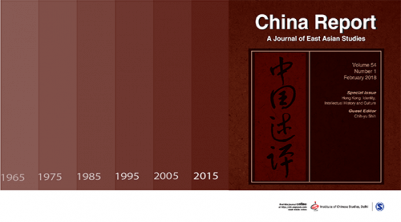
I ORIGINAL ARTICLES
- Understanding Colonial Border Making: British India and China
Vijay K Nambiar
Abstract
- Managing the COVID-19 Pandemic in China: A Biopolitical Approach
Evangelos Fanoulis and Alessandra Cappelletti
Abstract
- An Empirical Study on the 1992 Consensus, China’s Favour-Granting Policies and Taiwanese Identification with China
Shih-Kai Lin and Hung-Chang Chung
Abstract
An Introductory Note for the Articles
- Prior to the arrival of British colonial power in the subcontinent, India’s northern neighbours were generally considered to comprise Tibet on the one hand and the assorted post-Timurid Khanates of Central Asia on the other. Like India, these regions also experienced the influx of colonial rule. Though Tibet rose as an empire in the seventh century, by the mid-seventeenth century, its political fortunes had depended on the state of its relations with the Zhungars, Mongolia and China. The Manchu emperors’ territorial expansion into Inner Asia was without precedent in Chinese history, and ‘the Qing pacification of independent territories to the north, west and south of China proper was, in magnitude, one of the largest territorial expansions in seventeenth- and eighteenth-century world history’ (Di Cosmo 1988, The International History Review 20, no. 2: 288). Though in matters of religion, Tibet looked south to India, in political terms, notwithstanding the occasional forays by Kashmiri and Gurkhas forces into Tibet in the eighteenth century, Lhasa’s main attention was always directed eastwards to the Mongols and towards China.
- The biopolitical management of populations during the COVID-19 pandemic has been evident all around the world, and even more pronounced in authoritarian regimes. This article by Evangelos Fanoulis and Alessandra Cappelletti substantiates the sociopolitical implications of the new practices of governance that emerged during the pandemic in China. Our research question reads as follows: How has China’s regime managed the COVID-19 pandemic and with what sociopolitical implications? We argue that China’s Party-State has used the pandemic to biopolitically engineer the Chinese nation. China’s political leadership has used the opportunity of the pandemic to further downsize the voice of national minority groups, eventually nullifying their right to political subjectivity and identity. And it has also implemented policies to discourage holders of foreign passports from returning or settling in China, implicating that foreign nationals may be now redundant in the country. Primarily on the basis of archival research and ethnography, we find that this biopolitical engineering has heavily relied on (Foucauldian) technologies of security and fear.
- Ever since Taiwan implemented the lifting of martial law and China initiated its policy of reform and opening up, both sides of the Taiwan Strait and their officials and private sectors have set up unprecedented exchanges and interactions. The literature covering the issue of cross-strait identity has become an integral part of the development of such relations, but as the Democratic Progressive Party (DPP) of Taiwan denies the existence of the 1992 Consensus, current cross-strait talks have fallen into a deadlock. Communist Party of China (CPC) authorities have perhaps noticed that it is difficult to force Taiwan to negotiate over the 1992 Consensus and have determined that the DPP government will never provide a satisfactory answer to the issue of national sovereignty. For this reason, CPC leaders have deemed that it is no longer necessary to engage in interactions at the official level. They have decided to bypass the Taiwan government and directly carry out unilateral work with the private sectors by proposing favour-granting policies with the expectation of using economic and cultural means to influence Taiwanese people to identify themselves with China. Taiwanese people’s identification with China is actually a political identification, which is an expression of political feelings as well as a political value or a political value orientation. Therefore, it is not necessarily rational thinking nor choice. The American scholar Ronald Inglehart has presented long-term observations on the relationship between European economic development and political and cultural changes and indicated that the former is an important variable affecting political culture, while political culture also shapes political identity. Therefore, this study focuses on Inglehart’s logical inferences and uses quantitative empirical methods for a discussion of cross-strait issues. This study by Shih-Kai Lin and Hung-Chang Chung obtains data from 1,237 samples through the distribution of questionnaires and applies Model 1 of Andrew F. Hayes’ process statistical analysis in SPSS statistical software to analyse the correlations among research variables in order to establish a well-rounded model including the 1992 Consensus, China’s favour-granting policies and Taiwanese identification with China. The research results show that: (a) China’s favour-granting policies have a positive effect on Taiwanese identification with China; (b) the 1992 Consensus has a positive effect on Taiwanese identification with China; but (c) the 1992 Consensus negatively influences China’s favour-granting policies and Taiwanese identification with China.
II REVIEW ESSAY
- Zhou Enlai: A Life, Chen Jian (Harvard University Press, 2024), $39.95, ISBN: 9780674659582
Kishan S. Rana
Abstract
III BOOK REVIEWS
- Jason Gainous, Rongbin Han, Andrew W. Macdonald and Kevin M. Wagner, Directed Digital Dissidence in Autocracies: How China Wins Online, England: Oxford University Press, 2023.
Namita Sharma
Abstract
- Steve Tsang and Olivia Cheung (Eds.), The Political Thought of Xi Jinping, England: Oxford University Press, 2024.
Bhim B. Subba
Abstract
- Emmott, Bill, Deterrence, Diplomacy and the Risk of Conflict over Taiwan: The Adelphi Series, England: International Institute for Strategic Studies, 2024.
Gunjan Singh
Abstract
- Poonam Surie, Contemporary China: Tradition and Modernity, New Delhi: KW Publishers Pvt Ltd, 2024.
Vijay K. Nambiar
Abstract